AIDS Doesn’t Show Its Face
Inequality, Morality, and Social Change in Nigeria
9780226108834
9780226108667
9780226108971
AIDS Doesn’t Show Its Face
Inequality, Morality, and Social Change in Nigeria
AIDS and Africa are indelibly linked in popular consciousness, but despite widespread awareness of the epidemic, much of the story remains hidden beneath a superficial focus on condoms, sex workers, and antiretrovirals. Africa gets lost in this equation, Daniel Jordan Smith argues, transformed into a mere vehicle to explain AIDS, and in AIDS Doesn’t Show Its Face, he offers a powerful reversal, using AIDS as a lens through which to view Africa.
Drawing on twenty years of fieldwork in Nigeria, Smith tells a story of dramatic social changes, ones implicated in the same inequalities that also factor into local perceptions about AIDS—inequalities of gender, generation, and social class. Nigerians, he shows, view both social inequality and the presence of AIDS in moral terms, as kinds of ethical failure. Mixing ethnographies that describe everyday life with pointed analyses of public health interventions, he demonstrates just how powerful these paired anxieties—medical and social—are, and how the world might better alleviate them through a more sensitive understanding of their relationship.
Drawing on twenty years of fieldwork in Nigeria, Smith tells a story of dramatic social changes, ones implicated in the same inequalities that also factor into local perceptions about AIDS—inequalities of gender, generation, and social class. Nigerians, he shows, view both social inequality and the presence of AIDS in moral terms, as kinds of ethical failure. Mixing ethnographies that describe everyday life with pointed analyses of public health interventions, he demonstrates just how powerful these paired anxieties—medical and social—are, and how the world might better alleviate them through a more sensitive understanding of their relationship.
Reviews
Table of Contents
Introduction
Chapter One. Okada Men, Money, and the Moral Hazards of Urban Inequality
Chapter Two. Gender Inequality, Sexual Morality, and AIDS
Chapter Three. “Come and Receive Your Miracle”: Pentecostal Christianity and AIDS
Chapter Four. “Feeding Fat on AIDS”: NGOs, Inequality, and Corruption
Chapter Five. Returning Home to Die: Migration and Kinship in the Era of AIDS
Chapter S. Living with HIV: The Ethical Dilemmas of Building a Normal Life
Conclusion
Acknowledgments
Notes
References
Index
Chapter One. Okada Men, Money, and the Moral Hazards of Urban Inequality
Chapter Two. Gender Inequality, Sexual Morality, and AIDS
Chapter Three. “Come and Receive Your Miracle”: Pentecostal Christianity and AIDS
Chapter Four. “Feeding Fat on AIDS”: NGOs, Inequality, and Corruption
Chapter Five. Returning Home to Die: Migration and Kinship in the Era of AIDS
Chapter S. Living with HIV: The Ethical Dilemmas of Building a Normal Life
Conclusion
Acknowledgments
Notes
References
Index
Awards
Association for Africanist Anthropology: Elliott P. Skinner Book Award
Won
